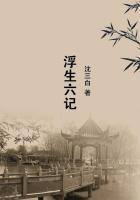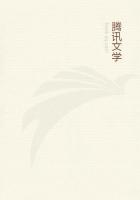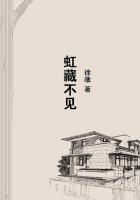As I listened to these sayings it seemed to me doubtful what the end of the city would be. And while this doubt was yet heavy upon me, I heard at midnight the faint calling of the trumpet, sounding along the crest of the mountains: and as I went out to look where it came from, I saw, through the glimmering veil of the milky way, the shape of a blossom of celestial blue, whose petals seemed to fall and fade as Ilooked. So I bade farewell to the old man in whose house Ihad learned to love the hour of visitation and the Source and the name of him who opened it; and I kissed the hands and the brow of the little Ruamie who had entered my heart, and went forth sadly from the land of Koorma into other lands, to look for the Blue Flower.
II
In the Book of the Voyage without a Harbour is written the record of the ten years which passed before I came back again to the city of Saloma.
It was not easy to find, for I came down through the mountains, and as I looked from a distant shoulder of the hills for the little bay full of greenery, it was not to be seen. There was only a white town shining far off against the brown cliffs, like a flake of mica in a cleft of the rocks.
Then I slept that night, full of care, on the hillside, and rising before dawn, came down in the early morning toward the city.
The fields were lying parched and yellow under the sunrise, and great cracks gaped in the earth as if it were thirsty. The trenches and channels were still there, but there was little water in them; and through the ragged fringes of the rusty vineyards I heard, instead of the cheerful songs of the vintagers, the creaking of dry windlasses and the hoarse throb of the pumps in sunken wells. The girdle of gardens had shrunk like a wreath of withered flowers, and all the bright embroidery, of earth was faded to a sullen gray.
At the foot of an ancient, leafless olive-tree I saw a group of people kneeling around a newly opened well. I asked a man who was digging beside the dusty path what this might mean. He straightened himself for a moment, wiping the sweat from his brow, and answered, sullenly, "They are worshipping the windlass: how else should they bring water into their fields?" Then he fell furiously to digging again, and Ipassed on into the city.
There was no sound of murmuring streams in the streets, and down the main bed of the river I saw only a few shallow puddles, joined together by a slowly trickling thread. Even these were fenced and guarded so that no one might come near to them, and there were men going among to the houses with water-skins on their shoulders, crying "Water! Water to sell!"The marble pools in the open square were empty; and at one of them there was a crowd looking at a man who was being beaten with rods. A bystander told me that the officers of the city had ordered him to be punished because he had said that the pools and the basins and the channels were not all of pure marble, without a flaw. "For this," said he, "is the evil doctrine that has come in to take away the glory of our city, and because of this the water has failed.""It is a sad change," I answered, "and doubtless they who have caused it should suffer more than others. But can you tell me at what hour and in what manner the people now observe the visitation of the Source?"He looked curiously at me and replied: "I do not understand you. There is no visitation save the inspection of the cisterns and the wells which the syndics of the city , whom we call the Princes of Water, carry on daily at every hour. What source is this of which you speak?"So I went on through the street, where all the passers-by seemed in haste and wore weary countenances, until I came to the house where I had lodged. There was a little basin here against the wall, with a slender stream of water still flowing into it, and a group of children standing near with their pitchers, waiting to fill them.
The door of the house was closed; but when I knocked, it opened and a maiden came forth. She was pale and sad in aspect, but a light of joy dawned over the snow of her face, and I knew by the youth in her eyes that it was Ruamie, who had walked with me through the vineyards long ago.
With both hands she welcomed me, saying: "You are expected. Have you found the Blue Flower?""Not yet," I answered, "but something drew me back to you.
I would know how it fares with you, and I would go again with you to visit the Source."At this her face grew bright, but with a tender, half-sad brightness.
"The Source!" she said. "Ah, yes, I was sure that you would remember it. And this is the hour of the visitation. Come, let us go up together."Then we went alone through the busy and weary multitudes of the city toward the mountain-path. So forsaken was it and so covered with stones and overgrown with wire-grass that Icould not have found it but for her guidance. But as we climbed upward the air grew clearer, and more sweet, and Iquestioned her of the things that had come to pass in my absence. I asked her of the kind old man who had taken me into his house when I came as a stranger. She said, softly, "He is dead.""And where are the men and women, his friends, who once thronged this pathway? Are they also dead?""They also are dead."
"But where are the younger ones who sang here so gladly as they marched upward? Surely they, are living?""They have forgotten."
"Where then are the young children whose fathers taught them this way and bade them remember it. Have they forgotten?""They have forgotten."
"But why have you alone kept the hour of visitation? Why have you not turned back with your companions? How have you walked here solitary day after day?"She turned to me with a divine regard, and laying her hand gently over mine, she said, "I remember always."Then I saw a few wild-flowers blossoming beside the path.















